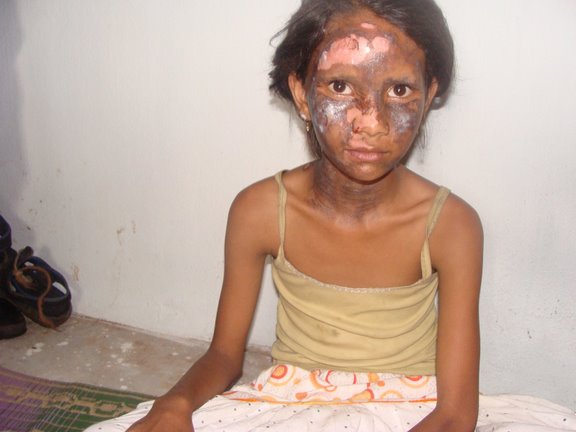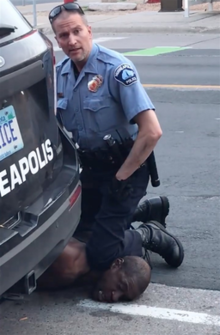Why must I go to alternate media for information about persecution?

(Image of Christian girl, Orissa, India who was bruised and burnt during the anti Christian violence in Orissa in August 2008. It occurred when a bomb was thrown into her house by extremists; Courtesy Wikipedia)
By Spencer D Gear PhD
 (Frame from witness video, showing Derek Chauvin kneeling on George Floyd‘s neck. Image courtesy Wikipedia).
(Frame from witness video, showing Derek Chauvin kneeling on George Floyd‘s neck. Image courtesy Wikipedia).
This article was published in On Line Opinion, 25 June 2020.
There have been 8:46 rallying cries across the USA to coincide with the length of time it was assessed for George Floyd to die on 25 May 2020. Others conclude it took 7 minutes 46 seconds.
The police officer, alleged perpetrator of the crime, Derek Chauvin, has been sacked from the police force. However, Floyd’s death has propelled rallies for ‘Black lives matter’ across the world – in the USA, Great Britain, across Europe, Australia, and in other countries.
This Rohingya crisis caught media attention.
I honestly support these protesters and their reasons. A policeman killing a man by putting so much pressure on his neck he could not breathe, if convicted, should be called a murderer.
However, there are other situations as serious that have had some mass and social media coverage. In recent years, mass media outlets have reported on the persecution of the minority sect that Rohingya Muslims have been persecuted in Myanmar (Burma) and have fled to Bangladesh.
BBC News (23 January 2020) gave details on the genocide of the Rohingya Muslims.
(Rohingya refugees in refugee camp in Bangladesh, 2017; Image courtesy Wikipedia)
‘The International Court of Justice (ICJ) has ordered measures to prevent the genocide of Rohingya Muslims in Myanmar (formerly Burma)….
Thousands of Rohingya died and more than 700,000 fled to Bangladesh during an army crackdown in 2017.
UN investigators have warned that genocidal actions could recur.
How have Myanmar people responded?
Tun Khin tweeted the ICJ ruling was ‘a crucial moment for Rohingya justice, and vindication for those of us who have lived through this genocide for decades’. He is the president of the Burmese Rohingya Organisation UK and continued:
‘The court’s decision clearly shows that it takes the allegations of genocide seriously, and that Myanmar’s hollow attempts to deny these have fallen on deaf ears’ (BBC News).
Human rights organisation Amnesty International said the ICJ decision ‘sent a message that the world would not tolerate Myanmar’s “atrocities”’.
The extent of Rohingya sprawling camps near the Bangladesh border for those fleeing Myanmar’s violence has been captured by a camera on a drone (BBC News 2017).
The Australian Government has explained its position but it hasn’t been updated since 14 June 2018. The Sydney Morning Herald (2017) reported: ‘Australia must act on Rohingya genocide’ which relates how ‘Almas saw her seven children and husband murdered during a wave of massacres in Myanmar. She and thousands of other survivors now face new threats as they languish in refugee camps’. ABC News, Brisbane Qld, ‘Aung San Suu Kyi denies genocide, says Rohingya Muslims caught up in armed internal conflict’.
Why don’t the people take to the streets with this slogan: ‘Rohingya Muslim lives matter’?
Why do I need to go to alternate media for other deaths?
George Floyd’s death is in the news, and rightly so. Have you heard much on the following?
Release International Voice reported on Indian Christian believers who were ‘taunted, beaten and forced to pose “like Christ on the cross” in police custody when extremists accused them of “forced conversion”’.
‘Pastor Indresh Kumar Gautam and four others were arrested after 30 Hindu extremists broke up their Sunday service in Pratapgarh district, Uttar Pradesh’. Australian mainstream media gives this persecution a flick pass as it doesn’t seem to have the worldwide implications of a George Floyd murder.
Why haven’t we heard a media campaign, ‘Indian teens’ lives matter’, following the death of a 16-year-old by stabbing and stoning? What was his crime? He was a Christian and wouldn’t renounce his faith. What was the crime he committed?
If it were not for alternate news’ sources I would not know of this persecution to death by Hindu extremists.
He refused to abandon his faith in Jesus Christ. Where were Australia’s news outlets to report this with catchphrases such as, ‘Indian Christian lives matter’?
It’s time for the ABC, SBS, Fox News, Sky News, Channels 7, 9, and 10 to wake up to international news’ responsibilities. I commend The Guardian Australia edition for reporting in February 2020 on the Australian ambassador’s meeting with the Myanmar military chief who was accused of Rohingya genocide. ‘Human Rights Watch has said Australia’s decision to take the meeting risked giving legitimacy and credibility to a military accused of mass atrocities’.
Other Australian news sources may have given limited coverage to some of the examples which follow. However, as a regular news reader and watcher, I have not seen any kind of uprising like ‘black lives matter’ in association with the deaths of other ethnic minorities – except Rohingya Muslims.
According to The Gulf News (01 March 2020) in Pakistan, 22-year-old Saleem Masih was ‘tortured to death for taking a dip in a village tube well in Pakistan, his fault was that he was a Christian’ and ‘polluted’ the water he bathed in.
Masih’s father said Saleem claimed the men who attacked, abused and cursed him did it because he was a ‘filthy Christian’. Social media users were furious about Saleem’s treatment and spread the word through #JusticeForSaleemMasih. ‘Pakistani Christian lives matter’.
The Buddhist minority in Vietnam has been under threat for decades in fear of persecution. At the Taiwan International Religious Freedom Forum in Hsinchu City in June 2018, Vo Tran Nhat, executive secretary of the Vietnam Committee on Human Rights, a nongovernmental organisation founded in Paris in 1975, explained his views as a non-religious person: ‘He cares a great deal about the Buddhists and minority Christians, who raise their voices against oppression and injustice. If Buddhists lose their religion, Vietnam would lose its “soul,” he warned’.
What has Australia’s main-stream media reported about these situations?
- ‘Militants who murdered Christian children in Nigeria’;
- ‘The 50 most dangerous countries in which to follow Jesus’;
- ‘Elderly Christians across China are deprived of government subsidies if they continue practicing their faith’, and
- ‘At least 57 people were killed in renewed attacks by jihadists on villages in the mainly-Christian north-east of the Democratic Republic of Congo, at the end of May’.
There are many other examples that the mass media choose to ignore. I’m thinking of a Syrian refugee in Lebanon who maintains his allegiance to Jesus in spite of suffering unemployment, persecution from Muslim family members, and homelessness.
An Egyptian woman is another case in point. She was kidnapped by extremists, forced to convert to Islam and marry a Muslim man. It is exceedingly difficult to bring such women back home to a normal life when they live in an honour-shame culture.
In April 2020, a Christian pastor, his wife and 15-year-old son were attacked by a Muslim neighbour in Pakistan. They were severely injured by machetes, sticks and pistols and they were treated in hospital. The case was reported to a local police station. Pakistani Christians face severe maltreatment. Often it comes from family members, radical Islamic groups, and even the government.
North Korea is a closed country and distribution of unapproved literature is a capital offence that could lead to forced labour or execution.
However, in 2014 Natasha Moore from the Centre for Public Christianity (a Christian organisation) published an opinion piece for the ABC’s, The Drum, Why don’t we hear about persecuted Christians? She gave an example of ‘the plight of Mosul’s Christians [that] has been noted by a growing number of news outlets, from The Independent to The New York Times. It has broken the surface of the international news cycle in a way that other atrocities – the fire-bombing of churches in Nigeria, the summary execution of North Koreans caught with Bibles – have not’. She does not consider the media were covering up the global persecution, but it reveals the media’s blind spots. As an example of the seriousness of the situation, she stated that Christians were persecuted in139 countries and about four or five acts of religious discrimination are against Christians.
Countries that were moderately secular and are now ‘avowedly secular’ have stepped up their hostility towards Christians. Turkey and Egypt join with post-communist, Islamic and some South Asian countries, Moore wrote. She referred authors to the 2008 book, Blind Spot: When Journalists Don’t Get Religion (Paul Marshall et. al.).
Farce of injustice by media
I find it to be a pretence against fair journalism when the media can so promote ‘Black lives matter’ when we have examples of Buddhist lives matter, Rohingya Muslim lives matter, and Christian lives matter around the world.
When will we see major, objective reporting on the Christian, Buddhist, Rohingya and other persecutions?

(Image courtesy fssx.news. An 11-year-old Christian child was beaten to death by his Muslim employer on July 11, 2019, in Faisalabad, in northeastern Pakistan.)
Copyright © 2020 Spencer D. Gear. This document last updated at Date: 24 June 2020.









